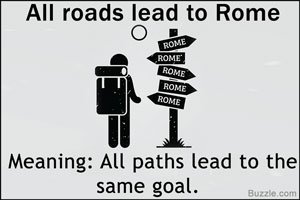
For a man whose favorite mode of communication seems to be carrier pigeons, our underground correspondent somewhere in an Atlantic seaboard state, Guy Noir - Private Eye, seems surprisingly savvy about contemporary electronic technology. He used some sort of messenger app on his smart phone (didn't know he even had one) to contact me today as I was sitting at my computer. All of a sudden, there he was, bushy beard and all. One might have mistaken him for one of them mountain men up in the hollers of the Appalachian mountains.
Anyway, he blurts out: "Peter Kreeft has a new book out on world religions. [This is the one I think he had in mind.] At Amazon, one reviewer calls him an 'exclusivist.'"
At which point Noir, without letting me get a word in edgewise, contorts his bearded face and simply yells into his phone: "TO WHICH I REPLY, ALL WORDS HAVE LOST THEIR MEANINGS NOW!"
"Well, what do you mean?" says I.
And he replies: "I esteem Kreeft and his writing, but he engates in wishful thinking and his solutions are compromises of the Wojtyla-Ratzinger-Bergoglio sort."
"Whaaaa???" says I.
"They do not solve problems but amplify them," says he. "Ratzinger has a book called Faith and the Future, which is like a political pamphlet in its effort to please."
"This is more on point ..." says he, "old but useful." And he sends me while still on messenger (don't ask how, I wouldn't know), sending me a link to this article by Stan Guthrie, "Whose Submission? A Muslim-Christian dialogue," a critical review of Kreeft's Between Allah and Jesus: What Christians Can Learn from Muslims from some years back.
Guthrie begins his review by quoting the first line of Kreeft's earlier classic, Between Heaven and Hell, about three luminaries -- John F. Kennedy, Aldous Huxley, and C. S. Lewis -- who each died on November 22, 1963. In the first line from that book, JFK asks, "Where the hell are we?"
Guthrie observes that he had a similar reaction after reading Kreeft's later work, Between Allah and Jesuss, noting that it seems to stand the earlier one on its head, making a Muslim protagonist "a stand-in for the Lord," even having him claim to be "a better Christian than his Christian foils." Of course, given the state of Christian catechesis these days, this may not be too far from the truth in some cases.
In any case, Kreeft, Guthrie, and Noir all raise an important question to think about: Have our words lost all their meanings now, or, at least, are we in danger of our words losing their meaning? If we accept von Balthasar or Fr. Barron's hypothesis that hell could be empty, or nearly empty, for example, has our use of the word 'salvation' or 'redemption' lost all meaning? It's a fair question. And the same could be asked of our 'pastoral' use of words like 'love,' 'mercy,' and 'forgiveness,' in venues where there is almost no reference to 'repentance' or 'contrition.' If all religions present genuine paths to God and all non-Christians, Protestants, and members of sectarian religious cults have a reasonable expectation of finding themselves in heaven in the world to come, then what's the point of converting to the Catholic Faith? For that matter, what's the point of the New Evangelization? Sweet, merciful Jesus could be so severe at times:
Enter by the narrow gate; for wide is the gate and broad is the way that leads to destruction, and there are many who go in by it. Because narrow is the gate and difficult is the way which leads to life, and there are few who find it. (Matthew 7:13-14)

No comments:
Post a Comment